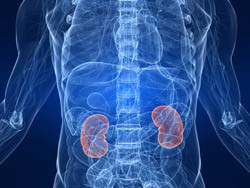An unknown risk factor of renal cell cancer
At present, around 300 000 new cases of renal cancer are diagnosed worldwide each year. RCC is a cancer of clear cells in the kidney parenchyma, and is highly resistant to therapy. Currently, resection of the tumour is the only option. The CAGEKID(opens in new window) (Cancer genomics of the kidney) initiative aimed to characterise genetic and epigenetic changes in clear cell RCC (ccRCC). Understanding the resulting downstream proteomic changes will ultimately lead to identification of new biological markers. CAGEKID completed sample collections, provided integrated genomic assessments of ccRCC and non-conventional (non-clear cell) forms of renal cancer, and conducted follow-up genomic and proteomic studies. The project established the largest collection of well-characterised RCC samples from eastern, central and western Europe. A total of 1 837 samples, including both conventional and non-conventional histological subtypes, were included in the study. These data provided new insights into disease aetiology with applications for diagnosis and treatment. The collected clinical and biological resources are now available to address future scientific and public health questions. The project found a specific mutational signature in a large proportion of ccRCC patients from central Europe. Analysed tumours had a very high number of mutations with a predominance of A:T>T:A transversions. This pattern is consistent with exposure to aristolochic acid (AA), a previously unknown risk factor for common cancer. Exposure to AA was previously shown to lead to AA nephropathy, characterised by chronic renal disease. It occurs in parts of the Balkans due to contamination of wheat with seeds of Aristolochia clematitis. Cultured mouse fibroblasts exposed to AA also exhibit a global pattern of A:T>T:A mutations with similar specific sequence context and strand bias. The results demonstrated that AA is a likely carcinogen in ccRCC tumourigenesis, and that impact of exposure to AA may be broader than previously thought. This finding has major public health implications to be pursued beyond the project.







